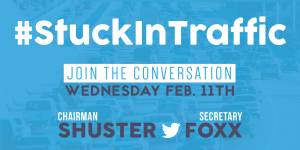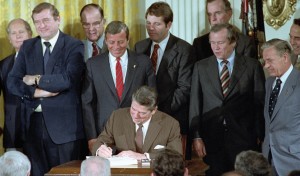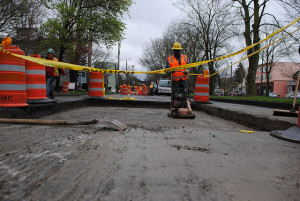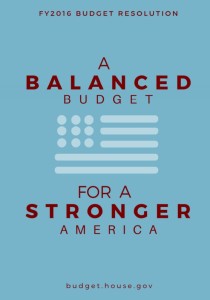Win One (Gas Tax) for the Gipper
May 27th, 2015 | By: America's Infrastructure Report Card
Summer reading lists of those in Washington, D.C. policy circles tend not to reflect titles that rank highly on the New York Times bestseller list. Case and point is a new work by Eno Center for Transportation senior fellow Jeff Davis, titled “Reagan Devolution: The Real Story of the 1982 Gas Tax Increase.” In the piece, Davis provides an excerpt from Reagan’s Saturday, Nov. 27, 1982 radio address where the president stated, “What we’re proposing is to add the equivalent of five cents per gallon to the existing federal highway user fee, the gas tax. That hasn’t been increased for the last 23 years. The cost to the average motorist will be small, but the benefit to our transportation system will be immense.” Reagan signed the gas tax bill on January 6, 1983. Much of that lore is known and has been repeated in recent years by ASCE and others as a symbol of leadership that existed during a time of heightened bipartisan understanding. However, Davis paints a more nuanced view, supported by primary documentation from President Reagan’s Simi Valley library and conversations with former Reagan staffers. The truth is that when it came to transportation, Reagan was both a pragmatic bipartisan deal cutter and limited government ideologue at the same time and certain policies, such as the enactment of the 1982 gas tax hike, bring this to light. The rubber met the road so to speak when following his 1982 State of the Union address where Reagan announced grand plans to block-grant a large portion of the federal budget including transportation programs to the states, Davis outlines that, “Negotiations with state governors and city and county officials over the specifics went poorly,” and Reagan was forced to abandon those efforts. Echos of the debate between raising the gas tax and devolving the federal program to the states ring as current today as they did in 1982. While the faces have changed and the party positions might be a bit altered, the national challenge that faced President Reagan and Congressional Democrats remains the same: How can the nation improve its transportation system and raise revenue for this cause in a way that can generate bipartisan support from federal, state and local lawmakers.? With the looming deadline of July 31 hanging over the fate of the current federal transportation program, let’s hope that today’s decision makers dive into this summer read and get to work on a solution quickly to #FixtheTrustFund.Tags: economics, failure to act, infrastructure, infrastructure report card, transportation
No Comments »
Congress Punts on Highway & Transit Improvements
May 21st, 2015 | By: America's Infrastructure Report Card
To use a common football analogy, this week Congress decided to “punt” on finding a long-term highway and transit funding solution and reauthorizing federal surface transportation programs. In football, the purpose of punting is for a team to be in a better strategic position following a failed offensive effort. Congress might need to be reminded of this because their action this week did nothing to get them closer to identifying a long-term solution to increase transportation investment. Their failure to deliver on this important objective harms the nation and will lead to more potholes, overcrowded transit cars, and more deficient bridges. The U.S. House of Representatives has already approved a measure to extend the current highway and transit program until July 31, 2015, and the U.S. Senate will soon follow suit. This sets-up a similar dynamic as we saw last summer, where the federal Highway Trust Fund will approach bankruptcy at the same time that programs to build roads, repair bridges and improve transit systems will expire. This means that at the U.S. Department of Transportation (USDOT) contingency planning will begin on how to soon slow down payments to states for project work completed and, if Congress fails to do anything by the end of July, plans will be in place for the possibility of an August highway and transit department shutdown. More importantly, the extension means that states and localities will pull back even further in their planning and delivery of projects amidst this summer uncertainty. This represents the state of affairs when Congress shirks its responsibility to provide states budget certainty and adequate funding to meet the mobility needs of their residents and local businesses. Over the next 11 weeks, ASCE will be urging Congress to find a real and lasting solution that will allow America to modernize our roads, bridges, and transit systems. We can’t do this alone; we need your help and voice in this policy debate to ensure that members of Congress feel the pressure on the need to act. Please take a moment and write you members of Congress and tell them that they need to fix the Highway Trust Fund and act to improve the nation’s transportation system. It’s fourth and inches and time for Congress to run a play that gets this issue across the goal line.Tags: congress, highway trust fund, infrastructure, transportation
Comments Closed
The Clock Ticks Louder
May 8th, 2015 | By: Olivia Wolfertz
With the end of May approaching and no long-term transportation funding bill on the horizon, a short-term patch will likely be Congress’ next move. If you’re thinking this is de ja vu from last summer, you’re not alone.In Missouri, the state gas tax has not been raised in 20 years, despite construction costs rising by 200 percent. Because Missouri has 1,600 bridges that are more than 75 years old, lack of funding is a growing issue. After an emergency bridge closure disrupted traffic flow this week, Governor Jay Nixon encouraged lawmakers to pass a bill that would increase the tax on motor fuels by 1.5 cents and the diesel tax by 3.5 cents. Without action, the governor said Missouri won’t have enough revenue to match federal dollars, which means the state will not see needed repairs, resulting in more traffic, and fewer jobs. In Nebraska, the unicameral legislature passed a 6-cent gas tax increase over four years, Legislative Bill 610, Gov. Ricketts promptly vetoed the bill, which now returns to the legislature for a likely override. In Michigan, Proposition 1, which would have increased the state gas tax and raised $1.3 billion for road maintenance, was vehemently rejected, leaving Michiganders left with poor road conditions and back at the drawing board to increase investments. On a positive note, in Washington state, both the House and Senate have passed separate bills to increase state transportation funding. The House plan gives Sound Transit authorization to ask voters for up to $15 billion to extend its light-rail system, and House democrats want to continue using some sales-tax revenue collected from construction projects for the general fund. The Senate plan would authorize up to $11 billion, and would funnel that money back to transportation projects. Right now there is no certainty over which plan will prevail. Both plans include similar highway, bridge and pedestrian projects and raise about $15 billion over 16 years by gradually increasing the gas tax to 11.7 cents. Next week is Infrastructure Week, which could not come at a more opportune time as Congress has 22 days until the highway and transit policy expires. It is crucial these conversations lead to action that ensures a sustainable, long-term funding solution to #FixTheTrustFund.#TBT to a year ago when we heard a year would give “the space” to do a long-term bill. It’s time to #fixthetrustfund pic.twitter.com/x5dzY4IGFf
— Senator Tom Carper (@SenatorCarper) May 7, 2015
Highway Trust Fund Insolvency: 30 Days and Counting
May 1st, 2015 | By: Olivia Wolfertz
There has been much discussion on Capitol Hill and throughout the nation about increasing funding for infrastructure. From highways to transit to ports, our nation depends on infrastructure to thrive. Though federal lawmakers are once again looking toward a short-term funding patch for the beleaguered Highway Trust Fund, ASCE continues to advocate for a long-term, sustainable funding solution. There have been several bills proposed by legislators in the past few months. The Update Act and Repatriation bill are two proposals that have garnered considerable media attention. In USA Today, Rep. Paul Ryan lauded the Repatriation bill, aimed at lowering the tax rate on overseas profits earned by U.S. corporations and using the tax revenue for the Highway Trust Fund, as part of a permanent reform going from a worldwide system to a “more internationally competitive exemption system.” ASCE supports these bills to fund surface transportation; however neither proposal has gained significant traction or bipartisan consensus on Capitol Hill. According to a recent poll by Mineta Transportation Institute, 71 percent of voters would be willing to pay a dime more than the current 18.4 cents-per-gallon gas tax if the money is spent on “projects to maintain streets, roads and highways.” In contrast to funding patches, raising the federal gas tax would be a stable source of direct funding for transportation infrastructure. While things at the federal level seem to have stalled, in Michigan voters will soon vote on Proposition 1, which would increase the state sales tax by 1 percent to generate around $1.2 billion a year for roads and at least $107 million annually for public transit and passenger rail. These state and federal propositions are steps in the right direction for restoring our nation’s transportation infrastructure. Given the Highway Trust Fund’s impending insolvency, it is more critical than ever that Congress work together to pass legislation to provide a sustainable, long-term funding solution to #FixTheTrustFund.Another packed week in Washington
April 24th, 2015 | By: Olivia Wolfertz
As the clock ticks, post-winter pothole damage accumulates and families and businesses are increasingly affected by the outdated infrastructure conditions, lawmakers and members of Congress are raising their voices to find sustainable funding solutions. With just 37 days until our current transportation funding extension expires, several states and industries are making their case for investment. In Michigan, harsh winters and lack of repairs have left only 17 percent of the roads in good condition, costing vehicle owners an additional $132 in damage costs each year. Since Michigan’s “largest economic sectors-manufacturing, agriculture and tourism-are highly reliant on an efficient and well-maintained transportation system,” addressing transportation needs is critical to the state’s economic well being. In response to the great investment need, Proposal 1, an amendment that would raise the state sales tax from 6 percent to 7 percent, would help pay for road repair among other things. Infrastructure impacts every sector of our economy —including our nation’s agriculture. A recent article in National Journal explored the challenges farmers and ranchers face in getting their products to markets both here and overseas through waterways, rails, roads and ports. In order to support our nation’s agriculture, locks and dams need to be rebuilt, roads need to be resurfaced, trains need new tracks and ports need modernization and stable labor relations. This week the U.S. Senate held two hearings on the federal transit program. During the hearings, the Banking Committee heard from transit stakeholders and Acting Federal Transit Administration Chief Therese McMillan on the need to provide additional funding for capital grants to match the growth in transit projects seeking funding. The Senate Transportation, Housing and Urban Development Appropriations Subcommittee also held a hearing on the Obama administration’s fiscal year 2016 (FY16) budget request, which includes the surface transportation re-authorization GROW America proposal. During the hearing, Foxx addressed questions about GROW America’s ability to ensure long-term solvency of the Highway Trust Fund. In response to criticisms that the act would not ensure long-term solvency of the Highway Trust Fund, Foxx pointed to the hope that visible infrastructure improvements might motivate lawmakers to secure a long-term federal funding solution. These state and federal propositions are steps in the right direction for restoring our nation’s infrastructure. Given the Highway Trust Fund’s impending insolvency, it is more critical than ever that Congress work together to pass legislation to provide a sustainable, long-term funding solution to #FixTheTrustFund.Tags: #HighwayTrustFund, congress, infrastructure
1 Comment »
It's Time Again to GROW America
April 1st, 2015 | By: America's Infrastructure Report Card
 During a recent interview with Politico’s Mike Allen, U.S. Secretary of Transportation Anthony Foxx noted that the nation’s transportation system is “in a huge ditch.” Yesterday, the U.S. Department of Transportation (USDOT) unveiled its idea on how to get America out of that ditch with their GROW America proposal. If the name sounds familiar, it’s because that was the original title of the previous federal surface transportation program proposal unveiled by the Obama Administration last year. The key difference this year is that the Administration has identified a specific funding source, taxing overseas corporate profits, to pay for the $478 billion, six-year bill.
The GROW America proposal, among other things, would:
• Increase the nation’s overall investment in transportation by 45%, with a 29% increase in highway spending and a 76% increase in transit spending;
• Provide $18 billion for a multi-modal freight program that strengthens America’s exports and trade;
• Include $28.6 billion for passenger rail programs;
• Double funding for the TIGER competitive discretionary grant program and create a new $6 billion highway and transit competitive grant program; and
• Double the Transportation Infrastructure Finance and Innovation Act (TIFIA) program which encourages utilization of innovative financing mechanisms.
USDOT published a state-by-state impact of the benefits of GROW America investment which included ASCE Report Card data on state needs and economic impacts. The GROW America Act is an important legislative marker that seeks to define the debate about the need to increase federal infrastructure investment in order to meet current and future capacity and maintenance challenges. Funding certainty is important to states for delivering projects, as the six-year time frame supports, but of additional importance is the need to increase overall federal funding. The current revenue rates have not risen since 1993 and since that time the cost to deliver projects has increased. Since 1993, in real terms, the average federal highway dollar has lost over a third of its purchasing power. Please urge your members of Congress to act now to grow the federal surface transportation program and fix the Highway Trust Fund.
During a recent interview with Politico’s Mike Allen, U.S. Secretary of Transportation Anthony Foxx noted that the nation’s transportation system is “in a huge ditch.” Yesterday, the U.S. Department of Transportation (USDOT) unveiled its idea on how to get America out of that ditch with their GROW America proposal. If the name sounds familiar, it’s because that was the original title of the previous federal surface transportation program proposal unveiled by the Obama Administration last year. The key difference this year is that the Administration has identified a specific funding source, taxing overseas corporate profits, to pay for the $478 billion, six-year bill.
The GROW America proposal, among other things, would:
• Increase the nation’s overall investment in transportation by 45%, with a 29% increase in highway spending and a 76% increase in transit spending;
• Provide $18 billion for a multi-modal freight program that strengthens America’s exports and trade;
• Include $28.6 billion for passenger rail programs;
• Double funding for the TIGER competitive discretionary grant program and create a new $6 billion highway and transit competitive grant program; and
• Double the Transportation Infrastructure Finance and Innovation Act (TIFIA) program which encourages utilization of innovative financing mechanisms.
USDOT published a state-by-state impact of the benefits of GROW America investment which included ASCE Report Card data on state needs and economic impacts. The GROW America Act is an important legislative marker that seeks to define the debate about the need to increase federal infrastructure investment in order to meet current and future capacity and maintenance challenges. Funding certainty is important to states for delivering projects, as the six-year time frame supports, but of additional importance is the need to increase overall federal funding. The current revenue rates have not risen since 1993 and since that time the cost to deliver projects has increased. Since 1993, in real terms, the average federal highway dollar has lost over a third of its purchasing power. Please urge your members of Congress to act now to grow the federal surface transportation program and fix the Highway Trust Fund.
Tags: congress, highway trust fund, infrastructure, report card, transportation
No Comments »
States Stepping Up
March 24th, 2015 | By: Becky Moylan
A growing number of states are taking action during their legislative sessions to increase investment in transportation. This trend is in vogue for several reasons. First, many states that have taken action have done so after years of kicking the can down the road. For example, Iowa’s 10-cent increase is the first boost since 1989. In that time, the cost of most other goods has nearly doubled. Yet, Iowa was trying to fund 2015 roads and bridges on 1989 dollars. That underinvestment was costing the state’s economy in other ways, as a recent assessment by TRIP demonstrated. Iowa’s roads and bridges are costing each Iowan $2 billion in additional vehicle operating costs, lost time and fuel due to traffic congestion, and financial costs from traffic accidents. Thanks to the increased revenues, the state will begin addressing many of its needs. Second, bipartisan action reflects the increasing understanding that deferring maintenance in the face of a funding deficit hurts economic competitiveness. Utah, another state that passed gas tax increase legislation this session, is expected to have huge population growth in the coming decades. To meet future needs, as well as address a projected funding shortfall, that state needed to increase its investment. Investing in roads and bridges has historically been a place of agreement from both sides of the aisle, and that trend continues this year. Another reason we have seen action is that people are sick of potholes and sitting in traffic and are becoming increasingly vocal about their desire to have safe, well-maintained roads and bridges. In the press release South Dakota Gov. Daugaard issued after signing his state’s gas tax increase into law, he emphasized that maintaining roads and bridges is one of the fundamental functions of government. The more lawmakers hear from constituents on the need for better roads and bridges and greater access to transit, the more likely they are to make it a legislative priority. Several other states are poised to take action this year that would better fund transportation. In legislative action, Idaho, Georgia and Washington are all considering and compromising on bills that would address each respective state’s needs. Also on the horizon are Minnesota, North Carolina and Nebraska. In Michigan, voters will head to the polls on May 5th to decide on a ballot measure that would increase funding for the Great Lakes state’s transportation network—a measure endorsed by many influential groups, the Governor, and the Detroit Free Press. All of this action at the state level, however, cannot take the place of the federal government’s essential role in transportation investment. To continue the momentum of this year’s state action—along with the trend of the past few years—the U.S. Congress needs to find a long-term, sustainable solution to fix the Highway Trust Fund. If they fail to act, our nation’s economic competitiveness is in jeopardy and states will be stuck with a much larger tab, or an even longer backlog of projects.Tags: congress, gas tax, highway trust fund, state government
No Comments »
Ice Cream Funding for Roads
March 20th, 2015 | By: Olivia Wolfertz
With spring approaching and our nation’s roads baring the battle scars of another rough winter, the dialogue surrounding the Highway trust Fund and need for a sustainable transportation solution is accelerating at the federal level and inspiring states to take more action. In Michigan, residents have responded to their road needs by creating a pothole challenge to identify the worst potholes in the state. One creative business entrepreneur even invented a pothole ice cream flavor to generate awareness about road funding needs, and plans to donate 1 percent of sales from the product to the state for repairs . Come May 5, voters will be asked to consider Proposal 1, which among other things would boost the state sales tax to 7 percent to eventually generate an extra $1.2 billion annually for roads. Congress’ 2016 fiscal budget release, which proposes levying a onetime toll on untaxed foreign earnings currently sitting overseas and using the proceeds to pay for infrastructure projects, has generated more federal dialogue on transportation needs. During National Journal’s “Running on Empty: Tackling America’s Infrastructure Crisis” event on Thursday in Washington, D.C., Transportation Secretary Anthony Foxx and House Transportation and Infrastructure Committee Chairman Bill Shuster discussed our transportation funding needs in relation to the new budget proposals. “I feel confident that we will do a long-term bill, a five- or six-year bill,” Shuster said, “because both sides of the aisle, both sides of the Capitol, both ends of Pennsylvania Avenue, everybody’s talking about a long-term bill.” Though raising the federal gas tax is not on the immediate horizon for many states, several states have benefited from gas tax raises to generate transportation funding. ASCE Senior Managing Director Casey Dinges, reported that 11 states, both conservative and liberal, have raised their fuel taxes since 2013. Recently South Dakota signed legislation to increase its 22-cent gas tax by six cents starting April 1. While the decision regarding long-term, sustainable transportation funding must be made at the federal level, the outcome of the decision affects each American. Congressman John Delaney invited Maryland residents to share how America’s infrastructure has affected their daily lives. He wants Congress to understand how “long commutes, unsafe bridges and overcrowded ports, railways and airports have a direct impact on people’s lives, on their businesses, on the amount of time we all are able to spend with our loved ones.”Our nation’s infrastructure needs are great, and every day from Main Street to Wall Street Americans are paying the price. It is critical that Congress work quickly to pass legislation to provide a sustainable, long-term funding solution to #FixTheTrustFund.
Tags: congress, highway trust fund, roads
1 Comment »
Budgets Represent Priorities
March 19th, 2015 | By: America's Infrastructure Report Card
This week the U.S. House of Representatives and the U.S. Senate majorities unveiled their fiscal year 2016 (FY16) budgets. Traditionally, passing a budget in Congress is a particularly partisan endeavor with most all members in the majority voting in favor of their budget, and all the minority members voting against it. Should this Congress pass a budget in the coming weeks, it will not have to go to President Obama for his signature as budgets are self-imposed restrictions on Congressional spending. However, occasionally Congress has increased funding levels for certain programs despite the budget instructing them not to do so. These proposals offer some insight into what transportation funding levels might look like in the coming year. Disappointing for transportation was that both the House and Senate budgets assumed that road, bridge and transit spending would be limited to incoming revenues to the federal Highway Trust Fund (HTF). This is a problem as the HTF has been facing fiscal pressure over the years and is forecast to require $13 billion in additional revenues in FY16 just to maintain current spending levels. Which is why ASCE supported a House Budget Committee amendment by Congresswoman Kathy Castor (D-FL) that would have maintained current spending levels for surface transportation. Unfortunately, the amendment failed in committee by a vote of 14-22. Better for transportation in the House and Senate budgets is the creation of what is known as a “reserve fund” for the HTF, which would allow the tax committees to determine how best to fill the trust fund hole in a way that is deficit-neutral. These ways could include raising taxes (including the federal gasoline tax), cutting spending, or transferring other government funds to transportation. ASCE called for and supported the creation of this HTF reserve fund, however in order to increase spending for other infrastructure sectors, like water, dams and levees, a broader Infrastructure Reserve Fund is also needed. Senate Budget Committee Ranking Member Bernie Sanders (I-VT) introduced such an amendment in committee, which ASCE supported, but unfortunately that too was defeated on a party-line vote. Earlier this year, ASCE endorsed legislation introduced by Senator Sanders that would increase funding for our nation’s transportation, water and other infrastructure sectors. The Senator is expected to offer other infrastructure-related amendments on the Senate floor when the budget is up for a vote there next week. The debate over the last few days on the budget has crystallized one key fact on transportation spending: the vast majority in Congress believe that we should be investing more in transportation but there is not yet widespread bipartisan consensus on exactly how to pay for it. ASCE needs your help to tell Congress to work quickly to identify a long-term, sustainable funding solution that would #FixTheTrustFund before the legislative deadline of May 31, 2015.Tags: congress, highway trust fund, infrastructure, transportation, water infrastructure
No Comments »
Chime in on Wednesday to Fix the Trust Fund
February 9th, 2015 | By: Becky Moylan
As Congress continues the debate on the best way to #FixTheTrustFund and modernize America’s roads, bridges, and transit, USDOT Sec. Foxx and Transportation & Infrastructure Chairman Bill Shuster are heading to Twitter for a bipartisan “townhall” to discuss surface transportation. The town hall, a first of its kind, will be Wednesday, Feb. 11 after Sec. Foxx concludes his testimony in from of the U.S. House of Representatives’ Transportation & Infrastructure Committee, around 12 p.m. ET. Now it’s up to you to ask your questions about transportation investment and voice your support for a long-term funding solution. To get the conversation rolling, here are some key facts from the 2013 Report Card for America’s Infrastructure that would make great tweeting material. To join in the conversation, use #StuckInTraffic anytime between now and Wednesday.
Now it’s up to you to ask your questions about transportation investment and voice your support for a long-term funding solution. To get the conversation rolling, here are some key facts from the 2013 Report Card for America’s Infrastructure that would make great tweeting material. To join in the conversation, use #StuckInTraffic anytime between now and Wednesday.
- One in nine U.S. bridges is structurally deficient.
- 45% of Americans don’t have access to public transportation.
- 42% of major urban highways are congested, costing the economy $101B a year.
- 32% of America’s major roads are in poor or mediocre condition.
- Americans spend nearly a week’s worth of vacation time—34 hours—stuck in traffic each year.
- If we don’t improve our transportation infrastructure, each family’s budget will lose $1060 a year by 2020.
- If we don’t improve our transportation infrastructure, America will lose 877,000 jobs by 2020.
Tags: bridges, congress, highway trust fund, roads, surface transportation, transit
No Comments »



 */ ?>
*/ ?>

















